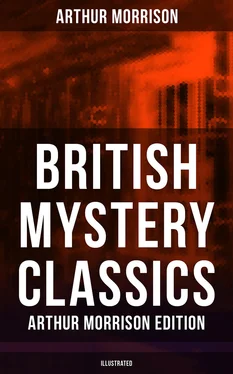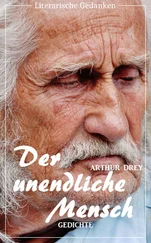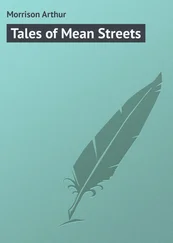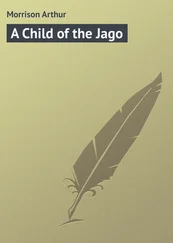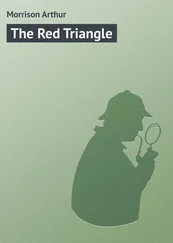1 ...8 9 10 12 13 14 ...56 There was little difficulty in identifying the three shops offered for letting by Mr. H. Danby. They were all together near the middle of the row, and were the only ones that appeared not yet to have been occupied. A dusty “To Let” bill hung in each window, with written directions to inquire of Mr. H. Danby or at No. 7. Now No. 7 was a melancholy baker’s shop, with a stock of three loaves and a plate of stale buns. The disappointed baker assured Hewitt that he usually kept the keys of the shops, but that the landlord, Mr. Danby, had taken them away the day before to see how the ceilings were standing, and had not returned them. “But if you was thinking of taking a shop here,” the poor baker added, with some hesitation, “I—I—if you’ll excuse my advising you—I shouldn’t recommend it. I’ve had a sickener of it myself.”
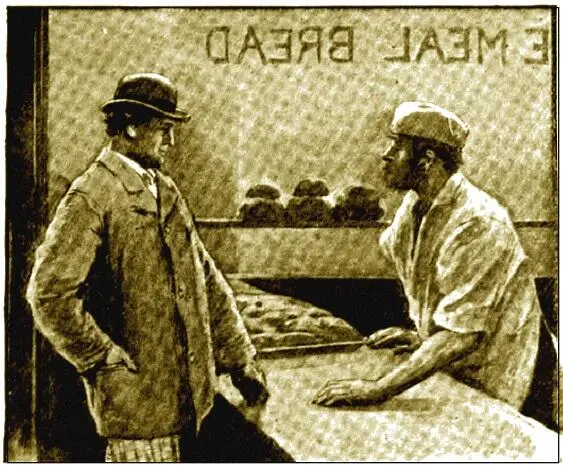
Hewitt thanked the baker for his advice, wished him better luck in future, and left. To the Hare and Hounds his pace was brisk. “Come,” he said, as he met Kentish’s inquiring glance, “this has been a very good day, on the whole. I know where our man is now, and I think we can get him, by a little management.”
“Where is he?”
“Oh, down in Padfield. As a matter of fact, he’s being kept there against his will, we shall find. I see that your friend Mr. Danby is a builder as well as a bookmaker.”
“Not a regular builder. He speculates in a street of new houses now and again, that’s all. But is he in it?”
“He’s as deep in it as anybody, I think. Now, don’t fly into a passion. There are a few others in it as well, but you’ll do harm if you don’t keep quiet.”
“But go and get the police; come and fetch him, if you know where they’re keeping him. Why—”
“So we will, if we can’t do it without them. But it’s quite possible we can, and without all the disturbance and, perhaps, delay that calling in the police would involve. Consider, now, in reference to your own arrangements. Wouldn’t it pay you better to get him back quietly, without a soul knowing—perhaps not even Danby knowing—till the heat is run to-morrow?”
“Well, yes, it would, of course.”
“Very good, then, so be it. Remember what I have told you about keeping your mouth shut; say nothing to Steggles or anybody. Is there a cab or brougham your son and I can have for the evening?”
“There’s an old hiring landau in the stables you can shut up into a cab, if that’ll do.”
“Excellent. We’ll run down to the town in it as soon as it’s ready. But, first, a word about Crockett. What sort of a lad is he? Likely to give them trouble, show fight, and make a disturbance?”
“No, I should say not. He’s no plucked un, certainly; all his manhood’s in his legs, I believe. You see, he ain’t a big sort o’ chap at best, and he’d be pretty easy put upon—at least, I guess so.”
“Very good, so much the better, for then he won’t have been damaged, and they will probably only have one man to guard him. Now the carriage, please.”
Young Kentish was a six-foot sergeant of grenadiers home on furlough, and luxuriating in plain clothes. He and Hewitt walked a little way toward the town, allowing the landau to catch them up. They traveled in it to within a hundred yards of the empty shops and then alighted, bidding the driver wait.
“I shall show you three empty shops,” Hewitt said, as he and young Kentish walked down Granville Road. “I am pretty sure that Sammy Crockett is in one of them, and I am pretty sure that that is the middle one. Take a look as we go past.”
When the shops had been slowly passed, Hewitt resumed: “Now, did you see anything about those shops that told a tale of any sort?”
“No,” Sergeant Kentish replied. “I can’t say I noticed anything beyond the fact that they were empty—and likely to stay so, I should think.”
“We’ll stroll back, and look in at the windows, if nobody’s watching us,” Hewitt said. “You see, it’s reasonable to suppose they’ve put him in the middle one, because that would suit their purpose best. The shops at each side of the three are occupied, and, if the prisoner struggled, or shouted, or made an uproar, he might be heard if he were in one of the shops next those inhabited. So that the middle shop is the most likely. Now, see there,” he went on, as they stopped before the window of the shop in question, “over at the back there’s a staircase not yet partitioned off. It goes down below and up above. On the stairs and on the floor near them there are muddy footmarks. These must have been made to-day, else they would not be muddy, but dry and dusty, since there hasn’t been a shower for a week till to-day. Move on again. Then you noticed that there were no other such marks in the shop. Consequently the man with the muddy feet did not come in by the front door, but by the back; otherwise he would have made a trail from the door. So we will go round to the back ourselves.”
It was now growing dusk. The small pieces of ground behind the shops were bounded by a low fence, containing a door for each house.
“This door is bolted inside, of course,” Hewitt said, “but there is no difficulty in climbing. I think we had better wait in the garden till dark. In the meantime, the jailer, whoever he is, may come out; in which case we shall pounce on him as soon as he opens the door. You have that few yards of cord in your pocket, I think? And my handkerchief, properly rolled, will make a very good gag. Now over.”
They climbed the fence and quietly approached the house, placing themselves in the angle of an outhouse out of sight from the windows. There was no sound, and no light appeared. Just above the ground about a foot of window was visible, with a grating over it, apparently lighting a basement. Suddenly Hewitt touched his companion’s arm and pointed toward the window. A faint rustling sound was perceptible, and, as nearly as could be discerned in the darkness, some white blind or covering was placed over the glass from the inside. Then came the sound of a striking match, and at the side edge of the window there was a faint streak of light.
“That’s the place,” Hewitt whispered. “Come, we’ll make a push for it. You stand against the wall at one side of the door and I’ll stand at the other, and we’ll have him as he comes out. Quietly, now, and I’ll startle them.”
He took a stone from among the rubbish littering the garden and flung it crashing through the window. There was a loud exclamation from within, the blind fell, and somebody rushed to the back door and flung it open. Instantly Kentish let fly a heavy right-hander, and the man went over like a skittle. In a moment Hewitt was upon him and the gag in his mouth.
“Hold him,” Hewitt whispered, hurriedly. “I’ll see if there are others.”
He peered down through the low window. Within Sammy Crockett, his bare legs dangling from beneath his long overcoat, sat on a packing-box, leaning with his head on his hand and his back toward the window. A guttering candle stood on the mantel-piece, and the newspaper which had been stretched across the window lay in scattered sheets on the floor. No other person besides Sammy was visible.
They led their prisoner indoors. Young Kentish recognized him as a public-house loafer and race-course ruffian, well known in the neighborhood.
“So it’s you, is it, Browdie?” he said. “I’ve caught you one hard clump, and I’ve half a mind to make it a score more. But you’ll get it pretty warm one way or another before this job’s forgotten.”
Sammy Crockett was overjoyed at his rescue. He had not been ill-treated, he explained, but had been thoroughly cowed by Browdie, who had from time to time threatened him savagely with an iron bar by way of persuading him to quietness and submission. He had been fed, and had taken no worse harm than a slight stiffness from his adventure, due to his light under-attire of jersey and knee-shorts.
Читать дальше
